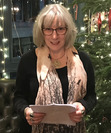The Long and Short of Writing.
It always surprises me the number of new writers I come across, on Twitter and in the writing groups on Facebook that seem to think more is better. As though a large word count gives them a better chance of being snapped up by a publisher, but all it really does is show their ignorance when it comes to writing a novel. An excessive length is a red flag that tells the agent and publisher what to expect. Two-dimensional, wooden or stereotypical characters in a wordy, poorly plotted, pace or constructed novel.
Of course, the first question we all should ask ourselves, before starting a novel, is how long is a novel?
It’s an important question, but we also should keep in mind that readers have busy lives, and their concentration span is much shorter these days as we all have less leisure time, too. Remember our phones keep us all busy. Look around you, how many people can you see holding physical books. Most are holding their phones. Yes, they might be reading kindle on their phone. It would be interesting to know whether this is true or not.
Now back to the question. How long is a novel?
The length of a book is normally the length of the story you are telling. Of course, you do need some sort of guideline, otherwise you could just keep on writing, which it seems many a new writer has a habit of doing.
Let’s have a look at the rough guideline for each of the genres.
Fantasy: 90k-125,000 words. These tend to be longer as the author needs to create a whole new world. Epic fantasy can go into the 180k-200,000-word range, but you have to be an established bestselling writer whose publisher will see a return on your books. Romance: 50k-90,000 words. Once again, it does depend on the sub-genre within the mainstream romance novels as most are usually between 70k-90,000 wordsScience Fiction: 90k-125,000 words. As with Fantasy, the longer books tend to be for stories that are creating new worlds different from our own. Mysteries & Crime: 80k-90,000 wordsThrillers: 80k-100,000 wordsHistorical: 80k-120,000 words. Lots of historical facts to get right, and to explain unfamiliar terms to the readers. Horror: 80k-100,000 wordsLiterary: 80k-120,000 wordsWestern: 50k -80,000 words. Short stories between 1,500 and 30,000 words, Novella, the average length is between 30,000 and 50,000 words.Flash fiction: the average length for these works is between 300 and 1500 words etc.If you’re writing nonfiction, you’ll need to check out different lengths, too.
If you’re an unpublished writer, you will find it much easier to get a literary agent or publisher interested if your novel is on the shorter side. It’s all about the cost and time involved getting your raw novel ready for publication. No matter how perfect you might think your novel is, the literary agent or publisher will go through it with a fine-tooth comb, and you’ll still need to edit it further.
If you’re hoping to hold a physical copy of your book, then keep to the lower end of the word count in your genre. Common sense is needed. If household bills are going up then the rising cost of living is affecting the pockets of the publishing world, too. No publisher will invest in an unknown writer’s first book unless they can be sure of a good return.
As a new writer your main focus should be on the quality of your writing, and not the quantity. Get your story down and then work your way through it sentence by sentence stripping out unnecessary words, information dumping, cliches, and especially purple prose. Remember your readers are intelligent people and we authors must respect them.
While writing this article, I did a quick survey across the internet on NextDoor, Facebook (4 sites), and Twitter. I asked two questions: 1) Do you read books on Kindle app on your phone? 2) Do you have less time to read?
Out of the 114 readers who answered the questions said:
Read real books only: 45Kindle app on tablet: 8Read Kindle app on phone: 12Kindle on device: 18audiobooks: 9read both physical & eBooks: 22When it came to whether readers had less or more time available to read it was about equal, but most leaned on having much less time nowadays. I think my quick survey would need more in-depth research like asking readers their age group. Maybe, older readers have more time on their hands for reading.
So, if you’re thinking about beginning a new novel today, remember less is more. Quality is better than quantity. Also, you need to remember writing a novel is the easy part, marketing your newly published novel is the toughest part of writing.
I hope you found this post an interesting read. Please do let me know if you read books on your phone or not. I think the numbers speak for themselves. Most readers still enjoy reading books no matter how they read them, which is the most important thing.
Chat again soon,



